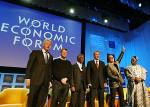Let Them Eat Cake – Will the Widening Gap Between the Rich and Poor Lead to Revolution?
In the Financial Timess, Pamela Gordon, whose income lands her smack in the middle class, was asked if she felt middle class. “I think middle class is someone who doesn’t have to wait until payday to pay their bills. If I miss one paycheck I’m in trouble.” Well fewer and fewer Americans are meeting that definition.
Income Gap Between the Rich and Poor Widest Ever
Wages have been stagnant since the 1970’s and declined since the turnoff the century. Both the relative quantity and quality of US median-income jobs has deteriorated. Coupled with the effects of the Great Recession, this decline has undermined the American dream. The housing crisis has left millions owing more than their homes are worth, while the distance between top earners and the median has grown, and the number of well-paying factory jobs has shrunk.
Watch This Video
In the postwar years there was a belief in developed economies that each generation could expect to have materially better living standards than their parents. But wages have declined in countries like Germany and Japan. Some of the pressure on the middle-income households was masked by the credit boom, which allowed families to spend more than they earned. According to Robert Reich, former U.S. Labor Secretary, the idea that your children will do better than you now seems an illusion for many Americans. So where did the growth in per capita national income go? The money flowed almost exclusively to the very richest. The Income Gap has been widening for some time; the earnings of US individuals with pre-tax income in the top 1 per cent accounted for 8 percent of growth in 1974, but rocketed to 18% by 2008.
Demand for high-skilled jobs has outweighed the growth of graduates for more than a generation. At the bottom of the earnings distribution, technology is still irrelevant, being of little use for tasks such as cleaning or caring for the elderly. But it has severely diminished the demand for routine but skilled task – the former backbone of employment for the middle class – from factory workers to fork-lift drivers. In our emerging world the fork-lift truck driver has been replaced by an automated distribution center.
Although the US has long had one of the highest income gaps, this is not just an American phenomenon. The Organization for Economic Cooperation and Development found increasing income inequality between the mid 1980s and late 2000s in 17 out of 22 “advanced” economies. Countries such as Denmark, Germany and Sweden, which have traditionally had low inequality, are no longer spared from the rising inequality trend. See Rising Income Gap in China
As discussed in an earlier blog, even the well-educated are finding a chilly reception in the Great Recession. It was income inequality, the poverty and unemployment of educated youth that led to the uprisings in Yemen, Syria and Egypt. It is the point where education and hard work does not offer the promised reward that can be the tipping point for uprising.
Sustainable Workforces – the Necessary Evolution
The U.S. way of life is under attack. China is poised to ascend to the global throne. What hope is there for us? There is a way.
Co-authors Phelps, who won a Nobel Prize for his work on the “natural” rate of unemployment, and Tilman in How a New Jobless Era Will Transform America, argue that dynamism in the U.S. has actually been in decline for a decade; with the housing bubble fueling easy (but unsustainable) growth for much of that time, we just didn’t notice. They finger several culprits: a patent system that’s become stifling; an increasingly myopic focus among public companies on quarterly results, rather than long-term value creation; and, not least, a financial industry that for a generation has focused its talent and resources not on funding business innovation, but on proprietary trading, regulatory arbitrage, and arcane financial engineering. The way out is a million points of light – innovating and redefining success.
The authors warn that lengthened unemployment will erode people’s skills so that they are no longer even qualifying for their old jobs. What they don’t fully take into account is the resilience of the human spirit. Recharge your battery by giving back, volunteering. The despair you may feel will be lifted. And then, if we form a culture and community that supports the belief in following your passion, the downtrodden unemployed will use their “sabbatical” to redefine who they want to be and what they want to be doing. The old adage that you help yourself by helping others can spring into life by an energized cadre of the unemployed pursuing their dreams and learning to live a life that while lean on material possessions, is rich on meaning and fulfillment. There are stories, even in these difficult times, of people following their passion and having it lead to economic security. I am one of them.





